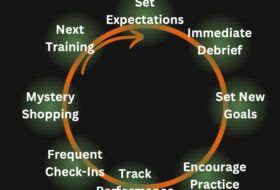The hospitality industry – hotels, restaurants, and wineries – often uses mystery shopping as a tool to measure our service experiences in unbiased ways. It helps us understand what our customers perceive and experience, as well as what they understand about our brand.
Statistics
WISE provides mystery shopping as a service, but we also do many informal shops when friends or family from out of the area come to visit. So by both anecdotal insights and from 4,000+ results of WISE shops, we see that while EVERY winery has a compelling brand story, tasting room staff are actually sharing the brand story less than 50% of the time.
Whether staff is bored with telling the same stories over and over again, or perhaps they believe every visitor already knows about the brand, the problem is that the key defining factor that separates one winery from its neighbor is their compelling brand story. People may not remember what the wine’s blend or alcohol content is, they may not remember the terrior, but what they will remember is the experience, the emotional connection they made to your brand through the power of your storytelling and engagement.
Great Salespeople Storytellers
By focusing on the experience and ensuring every guest makes an emotional connection through the engagement of storytelling and interactions, we leave a lasting impression with our guests – long after the initial visit. The best practice is to sell the brand first, wine second. Storytelling makes the brand come to life.
The best tasting room performers – the best salespeople – are all great storytellers because they weave a good tale. Including stories and analogies engages customers, gains trust, and earns sales. Those who are not comfortable with selling often revert to facts and figures and focus on the ‘what’ or the ‘how’ – not the ‘why’. A great example of how to clarify your brand messaging comes from Simon Sinek’s Ted Talk on How Great Leaders Inspire. Borrowing from Simon . . . employee knows what they do. Some know how they do it. Very few people know why the company does what it does. Making a profit does not count, that’s a result. The ‘WHY’ is the purpose. It is values-based. The right people – both employees and customers – will identify with it and that is what creates the connection that lasts far beyond the tasting room visit.
The reality is that brands are not in control of their story anymore. The key brand storyteller is the audience or consumers themselves. They shape the brand story, the representation of the brand and its perception. The reins have now been handed over. The best advice is not to talk at them, but have a conversation instead…engage with dialog.
One great way to really differentiate your brand when it comes to the tasting room experience is to share your WHY through memorable storytelling, and support this brand essence throughout your guest experience. Tell stories not just about the brand in general, but also about each wine. Bringing each wine alive with a story that talks about why this wine is special, and connecting that back to the brand, is the best way to share the ‘why,’ the uniqueness of our brand.
Facts and figures can be persuasive, but stories are memorable. The most powerful stories use emotion to connect with us on a human level. Good stories – the ones we remember because they captivated us – use all the right elements in the combination:
- captures your attention
- keeps you interested
- draws you in
- resonates with you
- builds a bond between you and the storyteller
- Be authentic, insightful, and true.
- Connect and engage with your audience – do not try to sell. Instead, work to fill their needs.
- Ensure the stories resonate with the brand’s vision and mission.
- Make them laugh, make them cry – just make them feel something that makes them want to connect with your brand.
So what are your winery’s great stories? What tales do you have to work with so that your customers will remember and re-tell them to their friends when they get home? Here are some topics to consider as you search for your own great stories – Start with WHY:
- The owner’s family and history – Why did they start the winery?
- Why did they choose the winery property and the building’s history – was the building previously used for something else?
- The winery dog/cat/canary
- The winemaker’s story and how they came to this career
- Famous visitors to the property
- Funny things other guests have said
This whole topic of stories is a great one for team meetings. Get your staff involved and see what stories are resonating with your customers. When guests laugh, what did they laugh at? What story closed the sale of wine or a club membership? Once you know what your most compelling stories are, be sure to start a written library of them so that new employees can read them and learn all your great stories before they have some of their own.
It’s Story Time! What’s your story?



